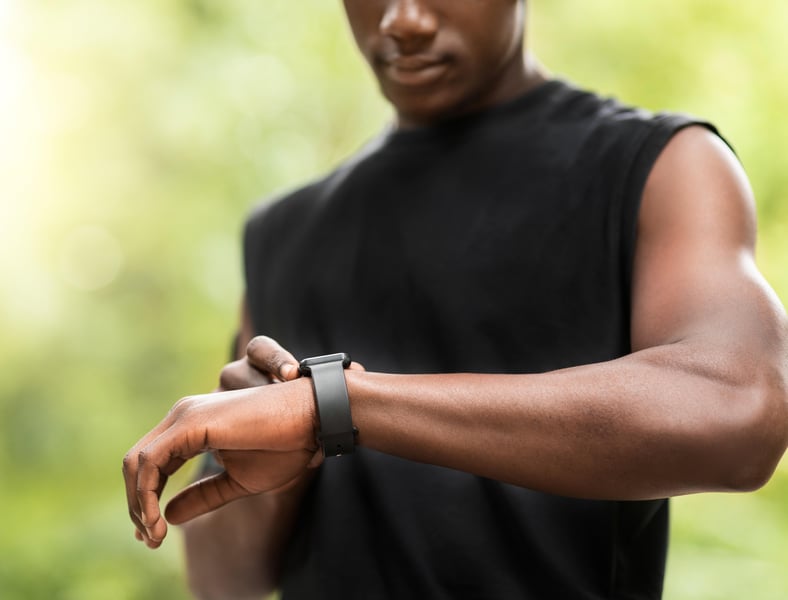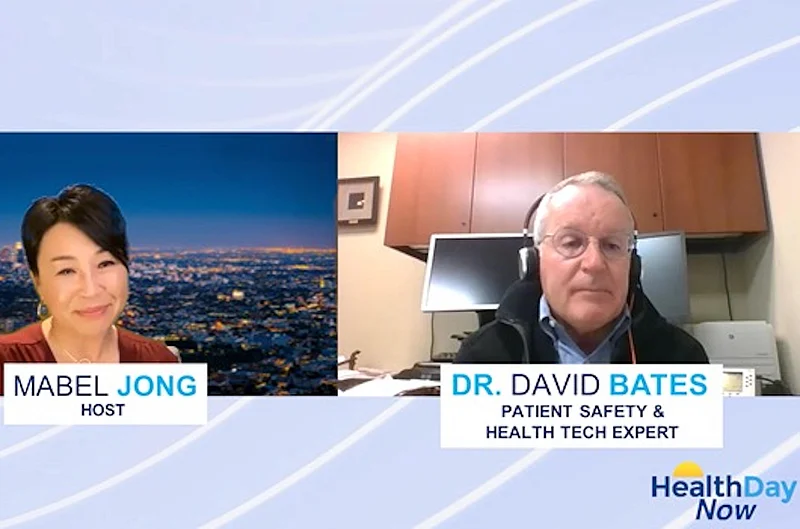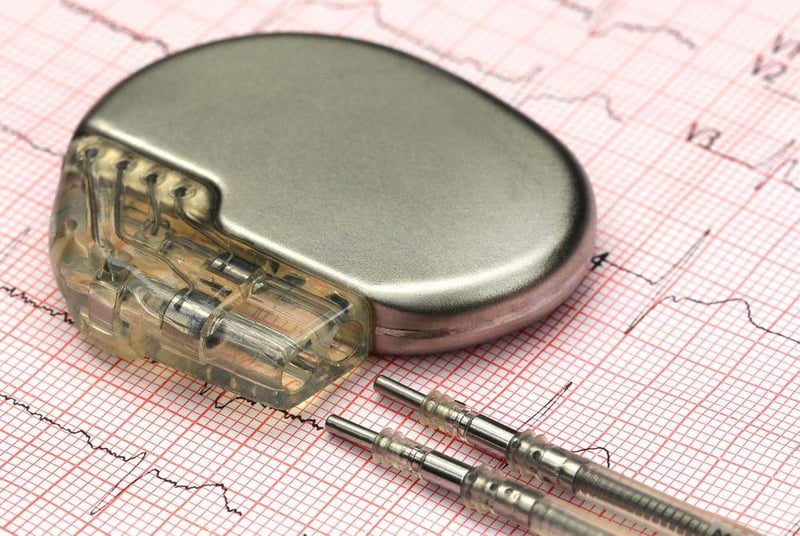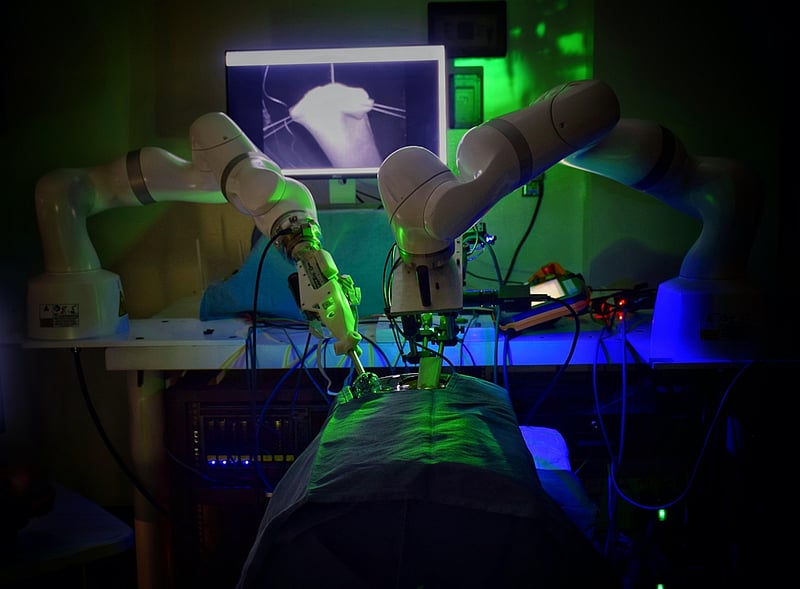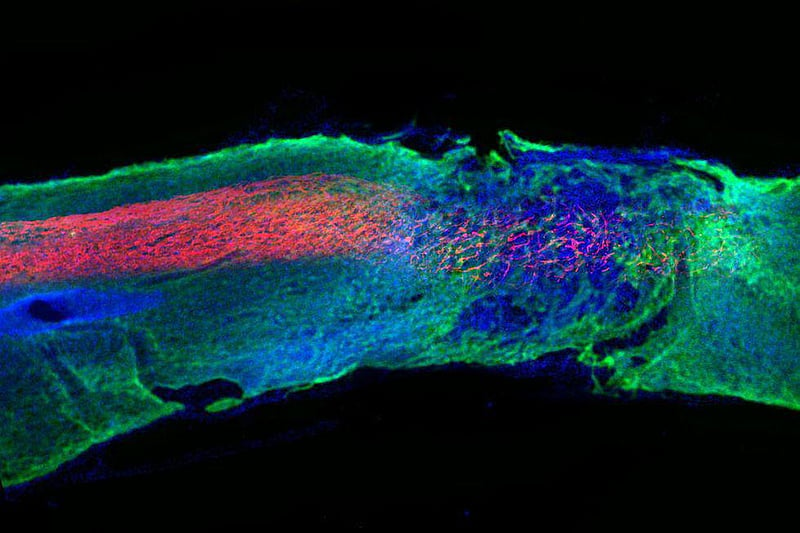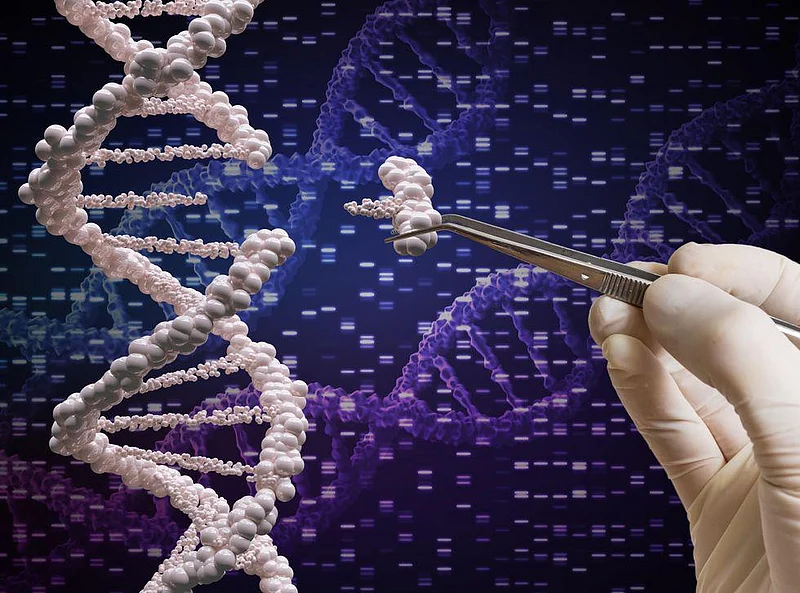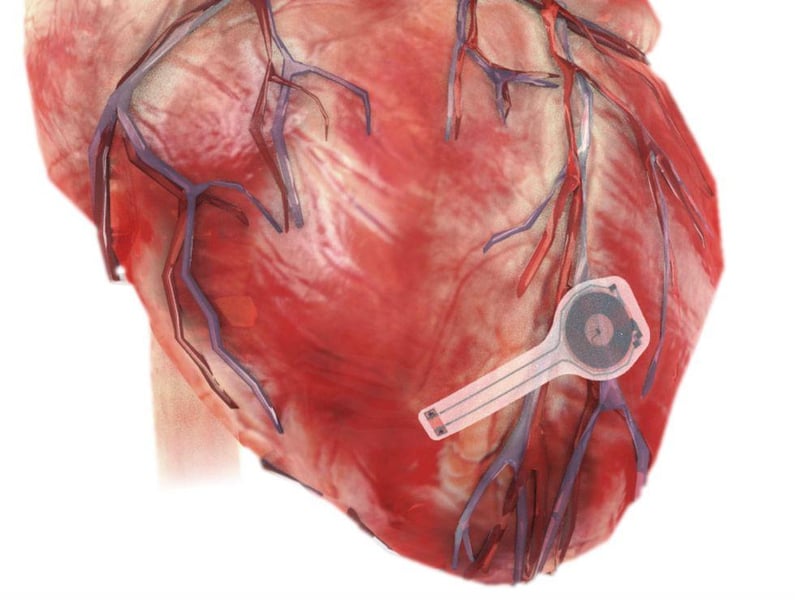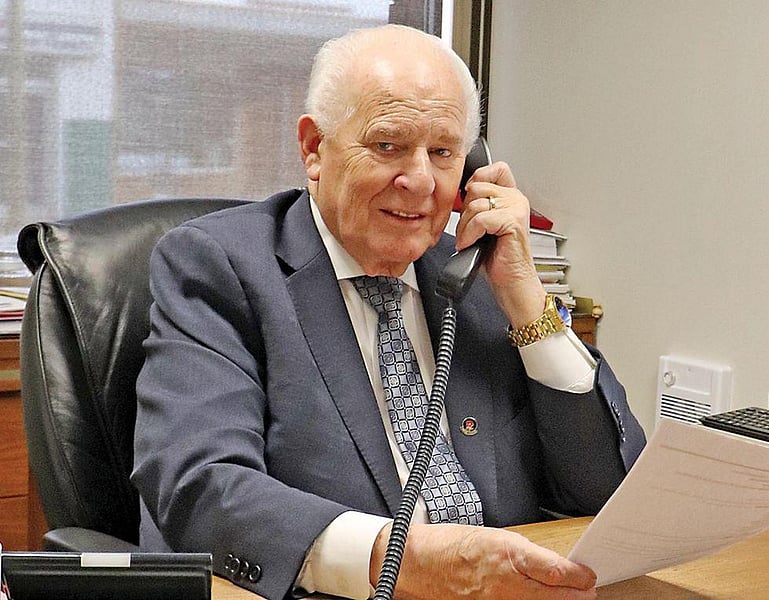Get Healthy!
252 Results for search "Medical Technology: Misc.".
Health News Results - 252
A noninvasive ultrasound technique is capable of quickly pulverizing kidney stones, an early study shows - in what researchers call a first step toward a simpler, anesthesia-free treatment for the painful problem.
The study reports on the first 19 patients who've had kidney stones treated with the ultrasound "bursts." So far, it's been able to completely, or nearly completely, break up st...
- Amy Norton
- |
- March 31, 2022
- |
- Full Page
A handful of "locked-in" amyotrophic lateral sclerosis (ALS) patients can now work a laptop computer using their brain waves, thanks to an implant lodged in a major vein inside their skull.
The implant - a stent lined with 16 miniscule electrodes - is nestled in a vein located near the motor cortex of complete...
- Dennis Thompson
- |
- March 30, 2022
- |
- Full Page
Millions of Americans use smartwatches or fitness trackers to check on their heart rate, but the accuracy may fall short for people of color, a new research review finds.
The analysis, of 10 published studies, found that in four of them, wearable devices were clea...
- Consumer news
- |
- March 25, 2022
- |
- Full Page
Health and fitness apps are growing in popularity, but not among the people who might benefit most from them - seniors and people with chronic health conditions.
Nearly two out of three American adults are living with a chronic health problem like heart disease, diabetes or asthma, a new HealthDay/Harris Poll survey found.
Are you managing a chronic health problem, be it obesity or diabetes or heart disease or asthma?
There's likely an app for that.
Health apps are becoming more and more sophisticated, offering smartphone users help in dealing with chronic ailments, said Dr. David Bates, chief of internal med...
- |
- March 4, 2022
- |
- Full Page
Some portable tech devices equipped with powerful magnets can interfere with your heart implant's ability to regulate dangerous irregular heart rhythms, a new study reports.
Swiss researchers found that Apple AirPods Pro, the Microsoft Surface Pen and the Apple Pencil all can temporarily throw a pacemaker/defibrillator off if they are held too close to the implant.
"These devic...
- |
- March 1, 2022
- |
- Full Page
A robot performed challenging keyhole surgery on pigs without any human help in what could be a major step toward fully automated surgery on people.
"Our findings show that we can automate one of the most intricate and delicate tasks in surgery: the reconnection of two ends of an intestine," said senior study author Axel Krieger. He is an assistant professor of mechanical engineering at J...
- Robert Preidt
- |
- January 28, 2022
- |
- Full Page
Having a child with type 1 diabetes can be a challenging health condition for parents to manage, but new research suggests an "artificial pancreas" system may beat standard treatment in controlling the blood sugar disease in young children.
Forms of the technology -- which automatically monitors and regulates blood sugar -- are already available for adults and kids with
The U.S. Army says it has developed a COVID-19 vaccine it believes could work against any and all coronavirus variants, including Omicron.
Results from early human trials of the Spike Ferritin Nanoparticle (SpFN) COVID vaccine are expected by the end of the month, the Army added.
Lab studies have already shown that the new vaccine protects monkeys from the original strain of COVID-...
- Dennis Thompson HealthDay Reporter
- |
- December 22, 2021
- |
- Full Page
People who get cochlear implants to treat severe hearing loss may develop new bone growth in the ear -- and it may lessen any hearing they have left, a new study hints.
The researchers found that among 100-plus adults with cochlear implants, two-thirds showed evidence of new bone formation near the implant within four years. And of patients who still had some hearing when they received th...
- Amy Norton HealthDay Reporter
- |
- December 8, 2021
- |
- Full Page
Physiotherapist David Putrino was working on a vibrating glove to help deaf people experience live music when a friend mentioned that the same technology might stop tremors in people with Parkinson's disease.
Putrino, director of rehabilitation innovation for Mount Sinai Health System in New York City, was intrigued. The friend's father had Parkinson's, so they placed the new device on hi...
- Denise Mann HealthDay Reporter
- |
- November 22, 2021
- |
- Full Page
Despite stereotypes about seniors and technology, a small study suggests that older adults in the early stages of dementia can use smartphone apps as memory aids.
The researchers found that older people with mild impairments in memory and thinking were not only able to learn how to use the apps, they said the digital aids made their daily lives easier.
The apps were not specially de...
- Amy Norton HealthDay Reporter
- |
- November 18, 2021
- |
- Full Page
Claire Wiedmaier experiences epileptic seizures so bad that she's broken teeth while in their grip.
"I have some fake teeth. I broke my two bottom front teeth," said Wiedmaier, 23, of Ankeny, Iowa, who these days can expect to have at least four seizures a month.
Knowing when to expect a seizure would be a big help to her.
"It would be nice to know, because then I could get so...
- Dennis Thompson HealthDay Reporter
- |
- November 17, 2021
- |
- Full Page
Severe spinal cord injuries are incurable today in humans, but a new injectable therapy that restored motion in laboratory mice could pave the way for healing paralyzed people.
The therapy -- liquid nanofibers that gel around the damaged spinal cord like a soothing blanket -- produces chemical signals that promote healing and reduce scarring, researchers report.
The treatment p...
- Dennis Thompson HealthDay Reporter
- |
- November 12, 2021
- |
- Full Page
The word went out late last month throughout Utah -- if you've got a spare set of aluminum crutches lying around, you should donate them to your local hospital.
An international shortage of aluminum has caused delays in shipments of crutches and walkers, so Utah hospitals banded together for #LeanOnUtah -- a community drive to collect gently used durable medical supplies.
No patient...
- Dennis Thompson HealthDay Reporter
- |
- November 4, 2021
- |
- Full Page
Affordable over-the-counter hearing aids could soon bring relief to millions of Americans suffering from hearing loss, under a landmark proposal announced Tuesday by the U.S. Food and Drug Administration.
The proposal would create a category of hearing aids that could be sold directly to consumers, without either a medical exam or a fitting by an audiologist.
Until now, folks suffer...
- Dennis Thompson HealthDay Reporter
- |
- October 19, 2021
- |
- Full Page
Imagine battling debilitating depression for years, trying everything but finding little or no relief.
That's what Sarah, 36, lived with most of her adult life.
"I had exhausted all possible treatment options," recalled Sarah, who did not want her last name used. "It [depression] had controlled my entire life. I barely moved. I barely did anything. I felt tortured every day."
...
- Alan Mozes HealthDay Reporter
- |
- October 4, 2021
- |
- Full Page
Someday, your smartwatch might be able to tell you if you're coming down with a virus and how sick you'll be -- even before symptoms start.
In a small study, researchers showed that a wearable device, like a Fitbit or Apple Watch, could detect which patients had the H1N1 flu and which had a common cold.
"One of our goals was to be able to detect that infection before a person feels ...
- Steven Reinberg HealthDay Reporter
- |
- September 30, 2021
- |
- Full Page
After a heart attack, a smartwatch app may help keep patients from being hospitalized again, researchers say.
The app helps patients keep track of medications and make lifestyle changes. It may also reduce rehospitalization in the month after discharge by half, according to a new report.
The American Heart Association says one in six heart attack patients returns to the hospital wit...
- Steven Reinberg
- |
- September 27, 2021
- |
- Full Page
An artificial intelligence tool could help radiologists spot breast cancer on ultrasound images and reduce the need for extra testing, new research suggests.
"Our study demonstrates how artificial intelligence can help radiologists reading breast ultrasound exams to reveal only those that show real signs of breast cancer, and to avoid verification by biopsy in cases that turn out to be be...
- Cara Murez
- |
- September 24, 2021
- |
- Full Page
The "white cane" that many blind people rely on for navigating the world hasn't been upgraded in a century, but researchers are reporting progress on a "robo-cane" they hope will modernize the assistive device.
The prototype cane is equipped with a color 3D camera, sensors and an "on-board" computer designed to guide the user to a desired location -- and avoid any obstacles along...
- Amy Norton HealthDay Reporter
- |
- September 16, 2021
- |
- Full Page
Until now, folks suffering from hearing loss typically have had to fork out thousands of dollars for a device that could be adjusted only by a professional audiologist.
No wonder that only one-quarter of the nearly 29 million U.S. adults who could benefit from a hearing aid have actually tried one, according to the U.S.
A good Samaritan can save the life of someone in cardiac arrest if a portable defibrillator is nearby. Now, a pilot study suggests a new way to get the devices into bystanders' hands: drones.
The study, done in Sweden, found that drone delivery was a feasible way to get automated external defibrillators (AEDs) to the scene of a cardiac arrest. In fact, the drones typically beat ambulances...
- Amy Norton HealthDay Reporter
- |
- August 30, 2021
- |
- Full Page
A first-of-a-kind nerve stimulation treatment for people who have problems moving their arms after a stroke has been approved by the U.S. Food and Drug Administration.
"People who have lost mobility in their hands and arms due to ischemic stroke are often limited in their treatment options for regaining motor function," explained Dr. Christopher Loftus. He is acting director of the FDA's ...
- Robert Preidt and Ernie Mundell
- |
- August 27, 2021
- |
- Full Page
A new approach to spinal cord stimulation may drastically reduce chronic back pain, a small pilot study suggests.
The study, of 20 patients with stubborn low back pain, tested the effects of implanting electrodes near the spinal cord to stimulate it with "ultra-low" frequency electrical pulses.
After two weeks, 90% of the patients were reporting at least an 80% reduction in their pa...
- Amy Norton HealthDay Reporter
- |
- August 26, 2021
- |
- Full Page
Do you have an implanted defibrillator or pacemaker? Try keeping your smart watch or smart phone a few inches away from them.
New research from the U.S. Food and Drug Administration finds that your phone or watch could interfere with implanted heart devices.
Based on the new findings, heart patients and health care providers should be aware of potential risks, the research team...
- Ernie Mundell and Robert Preidt HealthDay Reporters
- |
- August 26, 2021
- |
- Full Page
Spit and scan. That's all you have to do, and in less than an hour, you can not only find out if you have COVID-19 but what variant you have, all without leaving your home.
This is the hope and promise of a new saliva-based COVID-19 test that is currently under development.
"Several at-home tests are available for telling you whether you have COVID-19, but none of them test for vari...
- |
- August 6, 2021
- |
- Full Page
Researchers have developed an implant that allowed a man with severe paralysis to "speak" again by translating his brain signals into text.
The achievement is the latest step in "brain-computer interface" (BCI) research.
Scientists have been studying BCI technology for years, with the aim of one day giving people with paralysis or limb amputations greater independence in their daily...
- Amy Norton HealthDay Reporter
- |
- July 15, 2021
- |
- Full Page
Modern, flexible boots may be just as good as old-school plaster casts when it comes to treating broken ankles, new research suggests.
Often related to sports, traffic accidents or falls, broken ankles can be simple breaks in one bone or more complicated fractures that involve several bones, according to the American Academy of Orthopaedic Surgeons. Ankle fractures don't always require su...
- Denise Mann HealthDay Reporter
- |
- July 14, 2021
- |
- Full Page
A quick daily "workout" for the breathing muscles may help people lower their blood pressure to a similar degree as exercise or even medication, a small study suggests.
The technique is called inspiratory muscle strength training (IMST), and it involves using a device that provides resistance as the user inhales -- essentially working out the diaphragm and other breathing muscles.
R...
- Amy Norton HealthDay Reporter
- |
- July 7, 2021
- |
- Full Page
The notion of parents picking out genetically perfect babies may seem like science fiction, but bioethicists warn in a new report that some companies have already started to offer couples going through in vitro fertilization (IVF) the means to pick better embryos through polygenic scoring.
Polygenic scores are a "weighted average of the contributions of all of the genes we have informatio...
- Dennis Thompson HealthDay Reporter
- |
- July 1, 2021
- |
- Full Page
Early research suggests that CRISPR gene-editing technology may some day lead to dramatic relief for patients struggling with amyloidosis, a rare but serious disease that can trigger organ failure.
"There are many different types of amyloidosis," explained study author Dr. Julian Gillmore, a researcher in medicine with the Centre for Amyloidosis and Acute Phase Proteins at University Coll...
- Alan Mozes HealthDay Reporter
- |
- June 29, 2021
- |
- Full Page
Good news for couples considering fertility treatments: Children born through assisted reproductive technology (ART) don't have an increased risk of cancer, researchers say.
In the new study, kids born through high-tech fertility treatments -- such as in vitro fertilization (IVF) and frozen embryo transfer (FET) -- were followed for 18 years on average.
The results should be "quite ...
- Robert Preidt
- |
- June 29, 2021
- |
- Full Page
Researchers are reporting early success with a temporary heart pacemaker that simply dissolves when it's no longer needed.
So far the work has been limited to animals and human heart tissue studied in the lab. But experts said the early findings are "exciting" and could eventually change the care of patients who need a pacemaker for only days to weeks.
Pacemakers are devices that ar...
- Amy Norton HealthDay Reporter
- |
- June 28, 2021
- |
- Full Page
Your health and fitness apps may have privacy issues that put your personal information at risk, researchers warn.
"This analysis found serious problems with privacy and inconsistent privacy practices in mHealth [mobile health] apps. Clinicians should be aware of these and articulate them to patients when determining the benefits and risks," lead study author Muhammad Ikram and his co-aut...
- Robert Preidt
- |
- June 17, 2021
- |
- Full Page
Norman Mayer, 86, walks around with a computer chip in his chest and doesn't think a thing about it.
Doctors implanted a tiny heart monitor chip in Mayer's chest after he suffered a mini-stroke in late 2015, to track his heartbeat and potentially detect an irregular heart rhythm called atrial fibrillation (a-fib).
"You don't even know it's there," said Mayer, the sitting mayor of th...
- Dennis Thompson HealthDay Reporter
- |
- June 9, 2021
- |
- Full Page
Patients facing relatively simple outpatient surgeries are nonetheless being told to undergo a number of preoperative tests that just aren't necessary, a new study reports.
More than half of a group of patients facing low-risk outpatient surgery received one or more tests -- blood work, urinalysis, an electrocardiogram (EKG), a chest X-ray -- prior to their operation.
One-third of p...
- Dennis Thompson HealthDay Reporter
- |
- May 27, 2021
- |
- Full Page
When someone comes in for a new heart stent, it's critical that the medical team doing the procedure knows several key facts about previous stents the patient has had.
But fewer than half of patients receiving a stent were still carrying the stent card that has those details with them, a new study finds.
Most of them - about 88% - do carry their phones, according to study author D...
- Cara Murez
- |
- May 19, 2021
- |
- Full Page
The U.S. Food and Drug Administration is warning that strong magnets in some cellphones and smartwatches can interfere with pacemakers and other implanted medical devices.
Studies have shown that these high-strength magnets may cause some implants to switch to "magnet mode," stopping normal functioning until the magnet is moved away from the device.
Many implants have a "magnet mode...
- Steven Reinberg
- |
- May 14, 2021
- |
- Full Page
A microchip implanted in the brain has allowed a paralyzed man to communicate by text -- at speeds that approach the typical smartphone user.
The achievement is the latest advance in "brain-computer interface" (BCI) systems.
Scientists have been studying BCI technology for years, with the aim of one day giving people with paralysis or limb amputations greater independence in their ...
- Amy Norton HealthDay Reporter
- |
- May 12, 2021
- |
- Full Page
Two widely used COVID-19 vaccines -- Pfizer and Moderna -- will likely remain powerfully protective against developing serious illness even if coronavirus variants somehow manage to infect vaccinated patients, new research suggests.
Both vaccines are based on messenger RNA (mRNA) technology. And investigators say that, at least in theory, such technology can deploy multiple levels of defe...
- Alan Mozes HealthDay Reporter
- |
- May 4, 2021
- |
- Full Page
A few days after his 74th birthday, Don Stivers received his dream gift -- a new heart.
"I was born with a very lousy heart," he explained. "Growing up, I decided I was going to overcome it and go to the Olympics and be a strong boy. And so everything I did was against doctors' orders. They said don't run, don't do this, but I did anyway, and I would turn blue and pass out, and my mother...
- Sarah Collins HealthDay Reporter
- |
- April 8, 2021
- |
- Full Page
For those who suffer painful arthritis in their aging knees, new research suggests a noninvasive treatment might deliver lasting relief.
Called genicular artery embolization, the roughly two-hour catheter treatment involves a once-and-done injection of tiny hydrogel particles into arterial pathways in the knee joint. The goal: To decrease overall blood flow in the joint, and thereby marke...
- Alan Mozes HealthDay Reporter
- |
- March 22, 2021
- |
- Full Page
Looking to shed some of those pandemic pounds? A new analysis says wearables like Fitbit and Apple Watch can help people slim down.
The researchers examined studies involving commercial health wearables and adults who were overweight/obese or had a chronic health condition.
After daily moderate-to-vigorous physical activity for a period between a month and a year, participants lost ...
- Sarah Collins HealthDay Reporter
- |
- March 22, 2021
- |
- Full Page
One in four U.S. households use smart speakers to check the weather, play music and query search engines. But a new technology may soon have folks asking, "Hey Google, how's my heart?"
Researchers from the University of Washington, Seattle, have developed a skill for Amazon Alexa and Google Home that allows the devices to check heart rhythms.
Like a bat using echolocation to hunt fo...
- Sarah Collins HealthDay Reporter
- |
- March 12, 2021
- |
- Full Page
A new type of surgery offers amputees better control of muscles that remain after surgery, and of their prosthetic limbs, its inventors say.
The standard surgical approach to amputation has changed little since the American Civil War, according to developers of the new approach. In their small study, the new procedure also helped curb pain and sensations like the troubling "phantom limb" ...
- Cara Murez HealthDay Reporter
- |
- March 9, 2021
- |
- Full Page
Access to potentially lifesaving 3D mammography isn't equal, new research shows.
"This study was about whether adoption of this technology is equitable. We're showing that it has not been, even though it has been [U.S. Food and Drug Administration]-approved for a decade now," said Dr. Christoph Lee. He is professor of radiology at the University of Washington School of Medicine, in Seattl...
- Ernie Mundell and Cara Murez HealthDay Reporters
- |
- February 24, 2021
- |
- Full Page
A steady sleep routine may do more than keep you well-rested: New research suggests that the more swings in your slumber schedule, the worse your mood and depression symptoms are likely to be.
Researchers from Michigan Medicine followed the sleep patterns of interns in their first year of residency after medical school. That irregular sleep schedule can increase a person's risk of depress...
- Cara Murez
- |
- February 23, 2021
- |
- Full Page
As the new coronavirus vaccine rollout gathers speed, elevators will likely become a flash point for businesses hoping to reopen offices while sticking to social distancing.
And a new computer simulation suggests that the usual "first-come, first-served" elevator routine is neither safe nor practical.
"Now that vaccines are within reach, many buildings are slated for phased re-openi...
- Alan Mozes HealthDay Reporter
- |
- February 17, 2021
- |
- Full Page
The U.S. Food and Drug Administration on Friday approved the marketing of a new "tongue strengthening" device to cut down on snoring in patients with mild obstructive sleep apnea.
Unlike devices used during sleep, this prescription device is used while awake, and is designed to stimulate and strengthen the tongue so that it doesn't collapse backward and obstruct the breathing airway durin...
- Ernie Mundell and Steven Reinberg HealthDay Reporters
- |
- February 8, 2021
- |
- Full Page


